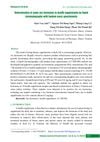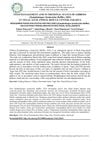 February 2024 in “Journal of Health Science and Medical Therapy”
February 2024 in “Journal of Health Science and Medical Therapy” ADAM17 could be a potential target for treating PCOS.
 January 2024 in “Scientific reports”
January 2024 in “Scientific reports” Egyptian Mint effectively kills mosquito larvae and inhibits certain bacteria.
 January 2024 in “International journal of homoeopathic sciences”
January 2024 in “International journal of homoeopathic sciences” Early intervention and patient education are crucial for managing alopecia areata.
 January 2024 in “Theranostics”
January 2024 in “Theranostics” Exosomes from special stem cells help treat ulcerative colitis by reducing inflammation and stress.
 January 2024 in “Regenerative Biomaterials”
January 2024 in “Regenerative Biomaterials” Dissolvable microneedles with Ginsenoside Rg3 can help treat hair loss by improving drug delivery and stimulating hair growth.
 December 2023 in “Kiểm nghiệm và An toàn thực phẩm/Kiểm nghiệm và An toàn thực phẩm (online)”
December 2023 in “Kiểm nghiệm và An toàn thực phẩm/Kiểm nghiệm và An toàn thực phẩm (online)” The method detected sex hormones in some health supplements, with one containing banned testosterone.
 December 2023 in “Journal of materials chemistry. B”
December 2023 in “Journal of materials chemistry. B” A new nanoemulsion increases oxygen for hair cells, leading to better hair growth.

Alopecia areata patients have higher levels of certain immune receptors, suggesting new treatment possibilities.
 October 2023 in “Journal of Medicine, University of Santo Tomas (JMUST Online)”
October 2023 in “Journal of Medicine, University of Santo Tomas (JMUST Online)” Elderly patients frequently suffer from skin conditions, especially inflammatory ones, highlighting the need for better healthcare.
 October 2023 in “Al-Kauniyah”
October 2023 in “Al-Kauniyah” Gibbons at Tegal Alur Animal Rescue Center need better feed management to improve their health and weight.
 October 2023 in “Frontiers in endocrinology”
October 2023 in “Frontiers in endocrinology” Effective PCOS treatments require targeting specific signaling pathways.
 October 2023 in “Scientific reports”
October 2023 in “Scientific reports” Dexamethasone affects hair growth by altering levels of proteins that either promote or inhibit hair follicle growth.
 September 2023 in “bioRxiv (Cold Spring Harbor Laboratory)”
September 2023 in “bioRxiv (Cold Spring Harbor Laboratory)” The mTurq2-Col4a1 mouse model shows that cells can divide while attached to stable basement membranes during development.
 September 2023 in “Curēus”
September 2023 in “Curēus” Reproductive hormones play a crucial role in breast cancer development and treatment challenges.
 September 2023 in “Clinical, cosmetic and investigational dermatology”
September 2023 in “Clinical, cosmetic and investigational dermatology” SLFC can improve scalp health and reduce sensitive scalp symptoms.
 August 2023 in “Scientific reports”
August 2023 in “Scientific reports” Human stem cells were turned into cells similar to those that help grow hair and showed potential for hair follicle formation.
 June 2023 in “Livestock studies”
June 2023 in “Livestock studies” The article concludes that understanding the molecular processes in hair follicle development can improve the quality of fibers like Angora and cashmere.
 June 2023 in “Research Square (Research Square)”
June 2023 in “Research Square (Research Square)” Hyaluronic acid and polycaprolactone improve skin regeneration, with polycaprolactone having a stronger effect on healing and tissue repair.
 June 2023 in “Medical records-international medical journal”
June 2023 in “Medical records-international medical journal” Decreased IGF-1R expression may contribute to sacrococcygeal pilonidal sinus development.
 April 2023 in “Acta Poloniae Pharmaceutica”
April 2023 in “Acta Poloniae Pharmaceutica” Herbal extract shampoo increased certain minerals in hair and improved hair growth and scalp health.
 January 2023 in “Biocell”
January 2023 in “Biocell” Safflower extract helps protect hair follicle cells from damage caused by chemotherapy.
 December 2022 in “International journal of preventive, curative & community medicine”
December 2022 in “International journal of preventive, curative & community medicine” PCOS is a common hormonal disorder in women, causing symptoms like acne and irregular periods, and is managed with medication and lifestyle changes.
 November 2022 in “CARDIOMETRY”
November 2022 in “CARDIOMETRY” A group has developed therapies that show promise for treating cancer and various other conditions.
 November 2022 in “SAS journal of medicine”
November 2022 in “SAS journal of medicine” There's no link between low iron levels and the hair loss condition, alopecia areata.
 October 2022 in “Journal for Research in Applied Sciences and Biotechnology”
October 2022 in “Journal for Research in Applied Sciences and Biotechnology” Certain changes in the SHBG gene may increase the risk of PCOS in Iraqi women.
 August 2022 in “Journal of Contemporary medical practice”
August 2022 in “Journal of Contemporary medical practice” Combining Traditional Chinese Medicine and Western medicine can improve symptoms, hormone levels, and pregnancy outcomes in Polycystic Ovary Syndrome patients, but more research is needed.
 July 2022 in “Research Square (Research Square)”
July 2022 in “Research Square (Research Square)” Lower PPARγ levels and specific gene variations are linked to more severe Frontal Fibrosing Alopecia.
 February 2022 in “International journal of KIU”
February 2022 in “International journal of KIU” Certain genes and nutrients like vitamin D, zinc, and omega fatty acids affect COVID-19 severity and infection risk.
 June 2021 in “bioRxiv (Cold Spring Harbor Laboratory)”
June 2021 in “bioRxiv (Cold Spring Harbor Laboratory)” KIF18B is important for correctly positioning cell division machinery in skin cells, affecting hair follicle development.
 May 2021 in “GSC Advanced Research and Reviews”
May 2021 in “GSC Advanced Research and Reviews” Hair color is influenced by genetics and can indicate certain health conditions.






























